International
FBI Director Christopher Wray uses Trump assassination attempt to attack encryption

FBI Director Christopher Wray testifies before the House Judiciary Committee
From LifeSiteNews
FBI Director Christopher Wray has used a congressional hearing organized after the assassination attempt on Donald Trump to launch another attack against encryption and use that as justification for the state of the investigation.
Appearing before the House Judiciary Committee last week, Wray was supposed to speak about the FBI’s investigation into this extremely serious incident, as well as about what the committee said is “the ongoing politicization” of the agency under his and Attorney General Merrick Garland’s direction.
But Wray turned it into blaming encrypted apps and services for the pace of the investigation. Quite extraordinarily for a person who is supposed to be highly knowledgeable about security, the FBI chief came across as oblivious to how essential encryption is for people’s online security – from their bank transactions to their communications.
Instead, he complained that it is difficult to break into accounts on encrypted platforms, that is, to break encryption – a situation that the FBI head said has “unfortunately become very commonplace.”
READ: Everything you need to know about the failed assassination attempt of Donald Trump
He went on to claim that law enforcement at all levels, federal, state, and local finds it “a real challenge.”
Reports say that the FBI had “early success” in breaking into the phone of the shooter, Thomas Matthew Crooks, using tools provided by Cellebrite. This is an Israeli company that oddly advertises its wares as “accelerating justice.”
Wray did not reveal which platforms host the accounts belonging to Crooks that the FBI says it has trouble accessing but noted that “legal process returns” are awaited to accomplish that goal.
And in the meanwhile, he told the Committee, U.S. law enforcement still doesn’t know why Crooks did what he did, implying that investigators are hampered by their inability to break encryption on apps, even though they have access to the shooter’s phone and laptop.
But, the “motive or ideology” that drove Crooks to attempt to assassinate Trump remains unclear, according to Wray. And he is strongly suggesting – always referencing encryption as the culprit – that this may remain so for good.
“Some places we’ve been able to look, some places we will be able to look, some places we may never be able to see, no matter how good our legal process is,” the FBI director told the committee.
Reprinted with permission from Reclaim The Net.
Business
Federal funds FROZEN after massive fraud uncovered: Trump cuts off Minnesota child care money

The Trump administration has cut off all federal child care payments to Minnesota, ordering a sweeping audit of the state’s day care system as investigators dig into what officials describe as one of the largest fraud schemes ever tied to social service programs.
“We have frozen all child care payments to the state of Minnesota,” Deputy Health and Human Services Secretary Jim O’Neill wrote Tuesday afternoon, saying the move comes after mounting evidence that taxpayer dollars were being siphoned to sham or non-operational day care centers. The freeze follows a viral investigative video that put a national spotlight on facilities across Minneapolis that were receiving large sums of public money despite appearing closed or barely functioning.
According to Alex Adams, assistant secretary at HHS’s Administration for Children and Families, Minnesota has already received roughly $185 million in federal child care funding this year alone. Those funds, the administration says, will remain locked down until the state can demonstrate that payments are being used lawfully. “Funds will be released only when states prove they are being spent legitimately,” Adams said.
We have frozen all child care payments to the state of Minnesota.
You have probably read the serious allegations that the state of Minnesota has funneled millions of taxpayer dollars to fraudulent daycares across Minnesota over the past decade.
Today we have taken three actions… pic.twitter.com/VYbyf3WGop
— Deputy Secretary Jim O'Neill (@HHS_Jim) December 30, 2025
O’Neill accused Minnesota officials of allowing abuse to fester for years, alleging the state has “funneled millions of taxpayer dollars to fraudulent daycares across Minnesota over the past decade.” To halt further losses, HHS outlined a series of immediate enforcement steps. Going forward, states seeking reimbursement through the Administration for Children and Families will be required to provide receipts or photographic proof documenting how funds are spent.
The department has also formally demanded that Gov. Tim Walz order a “comprehensive audit” of the day care centers flagged by investigators. O’Neill said the review must include attendance records, licensing documents, complaints, investigative files, and inspection reports. He pointed directly to a video published Friday by YouTuber Nick Shirley, who visited multiple Minneapolis-area centers listed as receiving millions in public funds but found locations that appeared closed or inactive.
In addition, HHS has launched a dedicated fraud hotline and email address at childcare.gov to encourage tips from parents, providers, and the public. “We have turned off the money spigot and we are finding the fraud,” O’Neill said, urging anyone with information to come forward.
Federal prosecutors say the scope of the alleged abuse is staggering. Authorities have already confirmed at least $1 billion in fraud tied to Minnesota child care programs, with 92 people charged so far. The U.S. Attorney’s Office has warned the total could ultimately reach as high as $9 billion as investigators continue combing through records.
The funding freeze marks one of the most aggressive crackdowns yet by the Trump administration on state-run social programs accused of lax oversight, sending a clear message that federal dollars will not flow until Minnesota can account for where the money went — and who was cashing in.
Business
Resurfaced Video Shows How Somali Scammers Used Day Care Centers To Scam State


From the Daily Caller News Foundation
A resurfaced 2018 video from a Minneapolis-area TV station shows how Somali scammers allegedly bilked Minnesota out of millions of dollars for services that they never provided.
Independent journalist Nick Shirley touched off a storm on social media Friday after he posted a photo of one day-care center, which displayed a banner calling it “The Greater Learing Center” on X, along with a 42-minute video that went viral showing him visiting that and other day-care centers. The surveillance video, which aired on Fox 9 in 2018 after being taken in 2015, showed parents taking kids into the center, then leaving with them minutes later, according to Fox News.
“They were billing too much, they went up to high,” Hennepin County attorney Mike Freeman told Fox 9 in 2018. “It’s hard to imagine they were serving that many people. Frankly if you’re going to cheat, cheat little, because if you cheat big, you’re going to get caught.”
Dear Readers:
As a nonprofit, we are dependent on the generosity of our readers.
Please consider making a small donation of any amount here.
Thank you!
Democratic Gov. Tim Walz of Minnesota was accused of engaging in “systemic” retaliation against whistleblowers in a Nov. 30 statement by state employees. Assistant United States Attorney Joe Thompson announced on Dec. 18 that the amount of suspected fraud in Minnesota’s Medicaid program had reached over $9 billion.
After Shirley’s video went viral, FBI Director Kash Patel announced the agency was already sending additional resources in a Sunday post on X, citing the case surrounding Feeding Our Future, which at one point accused the Minnesota government of racism during litigation over the suspension of funds after earlier allegations of fraud.
KSTP reported that the Quality Learning Center, one of the centers visited by Shirley, had 95 citations for violations from one Minnesota agency between 2019 to 2023.
President Donald Trump announced in a Nov. 21 post on Truth Social that he would end “Temporary Protected Status” for Somalis in the state in response to allegations of welfare fraud and said that the influx of refugees had “destroyed our country.”
-

 Business1 day ago
Business1 day agoICYMI: Largest fraud in US history? Independent Journalist visits numerous daycare centres with no children, revealing massive scam
-

 Alberta18 hours ago
Alberta18 hours agoAlberta project would be “the biggest carbon capture and storage project in the world”
-

 Energy15 hours ago
Energy15 hours agoCanada’s debate on energy levelled up in 2025
-

 Business16 hours ago
Business16 hours agoSocialism vs. Capitalism
-

 Energy17 hours ago
Energy17 hours agoNew Poll Shows Ontarians See Oil & Gas as Key to Jobs, Economy, and Trade
-

 Business2 days ago
Business2 days agoFeds pull the plug on small business grants to Minnesota after massive fraud reports
-

 Business2 days ago
Business2 days agoDOOR TO DOOR: Feds descend on Minneapolis day cares tied to massive fraud
-

 Business1 day ago
Business1 day agoCanada needs serious tax cuts in 2026






